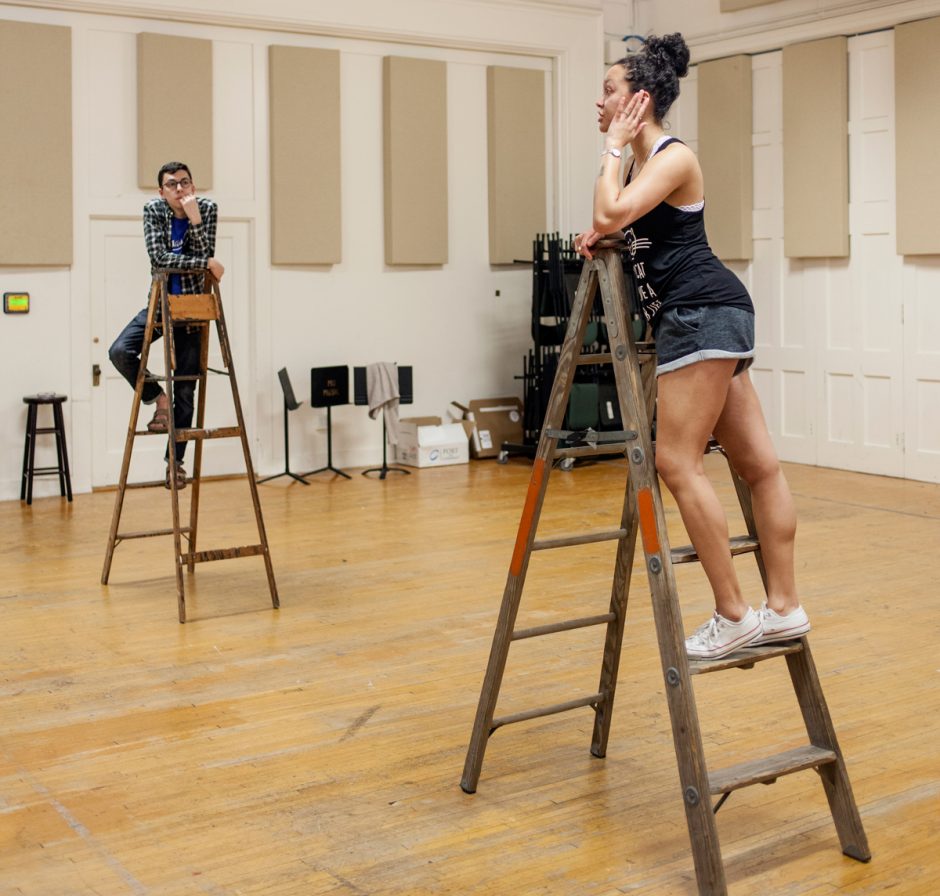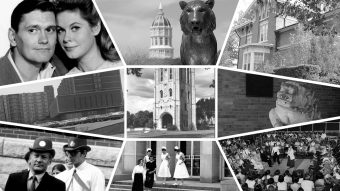
Though set in a very specific time and place, there’s an almost universal feel to Thornton Wilder’s Our Town. It’s immediately familiar, instantly understandable.
The play follows the everyday lives of the people living in the small town of Grover’s Corners, New Hampshire, in the early 1900s. Amidst other ordinary occurrences, next-door neighbors Emily Webb and George Gibbs grow up, fall in love and marry.
“The subject matter is so clearly part of what people perceive to be their background. Even those who didn’t grow up in a small town relate to it,” says Christine Seitz, a voice instructor with the University of Missouri School of Music and director of Show-Me Opera, which will perform an operatic setting of this American play March 10 and 11 at the Missouri Theatre.
The play debuted in 1938 and won a Pulitzer Prize for Drama. It was adapted for film in 1940, but when composer Aaron Copland, who wrote the film’s Academy Award-nominated score, approached Wilder about acquiring the rights to write an opera, Wilder declined.
Operatic adaptation
It wasn’t until the early 2000s that Wilder’s nephew Tappan Wilder, the literary executor of the Wilder Estate, granted poet J.D. McClatchy permission to develop Our Town’s script into a libretto.
“Music was an essential part of Thornton Wilder’s life. He played it, he studied it, he wrote about it. … But when it came to composers who wrote to him for permission to make his major plays into operas, it was a different story. He famously turned down requests from both Aaron Copland and Leonard Bernstein. (As a matter of fact, back in 1961, Ned Rorem had written to Wilder about setting one of his short plays — a request that went nowhere.) Wilder’s reasoning seems to have been that his plays were conceived in a specific genre, and to adapt them into another would compromise their integrity,” McClatchy wrote in an essay appearing on the Thornton Wilder family website.
But Rorem, a composer well known among the recital-hall set, would get his opportunity to put Wilder’s words to music some 40 years later, when he joined McClatchy on the Our Town project. Seitz said Rorem’s work boasts a lyrical, Americana feel — perfect for a play that so succinctly captures the feel of small-town America.
“It turns out to be a beautiful setting,” Seitz says.
Because musical time is longer than dramatic time, McClatchy had to condense the play, omitting some dialogue and even some of the characters. To retain the content and flow of the play, he wrote the libretto to include projected supertitles — commonly used to help audiences understand foreign-language operas — that help explain the setting and context where necessary.
University appeal
The opera premiered at Indiana University in 2006 and since then has been a popular show with college opera programs.
Seitz said the project lends itself especially well to young performers, as the main roles weren’t written for mature voices. Vocalists’ voices don’t fully mature until they are in their late 20s or early 30s, Seitz said, and so some operas can pose significant difficulties for younger singers.
“These roles are approachable to student voices,” Seitz says.
"Last year we did Marriage of Figaro. There are a million recordings, and you can listen to different interpretations. For Our Town, all we have is the score."
Cassandra Gal, a senior vocal performance major from Jefferson City, said this opera bears a more conversational quality than what's commonly associated with the genre.
“It’s more a speech-like opera than a full-out-singing opera like from Puccini or Verdi. This is much more Americana, which I love. It’s allowed us to be more true to our natural speaking voices than you see in those super over-the-top operas,” Gal said.
Still, Our Town is no easy opera. One of the biggest challenges for the students performing it is that no professional recording of the show exists. Students must read and interpret the music on their own.
Patrick Graham, a senior vocal performance major hailing from Lee’s Summit, said he found the exercise exciting.
“Last year we did Marriage of Figaro. It’s one of the best-known operas of all time. There are a million recordings, and you can watch people in different countries and listen to different interpretations of it. For Our Town, all we have is the score. Everything that I’m doing, I feel like it’s something I have to make a decision about,” Graham said.
But that isn’t to say the students have been without guidance. Marc Schapman, a former student of Seitz’s who now teaches voice at Southern Illinois University Edwardsville and who performed the role of George in the opera’s premiere, came to MU for a masterclass with Seitz’s singers, during which he coached some of the scenes.
Expanding range
Preparing for their roles over the past several months has afforded the students opportunities for growth.
Graham, who will play George in Friday night’s performance — Seitz often double casts the operas to ensure the most varied experiences for her students — learned to use his voice in a different way.
“The part of George is technically written for a tenor. I’m actually a baritone. There’s a different characterization,” Graham says. “George is young, eager. He speaks before he thinks. Baritones are usually the funny guy or they’re kind of haughty and romantic. It’s been a good challenge for me to step outside that typical role.”
For Gal, who will portray Emily on Friday, the role presented time for self-reflection.
“I’ve been practicing things like mindfulness for the past three years — being present in the moment — but I forget to do it all the time. Having this available this semester has been a blessing. I just feel like, ‘Oh my gosh, this is the worst day ever,’ but I lose myself in the music," Gal says. "It’s really rewarding to work on something that’s this deep and meaningful. It helps remind you that there are things in your life that are going to go wrong, but you have to focus on what’s important.”
"I find that final scene so poignant, I often find myself crying in rehearsal."
And thus lies the theme of the play: appreciating life as it happens. Seitz says the best play-to-opera settings are those with true dramatic purpose.
“When you bring a play into the opera world, there has to be a reason to sing. It raises it up another level, brings it into focus, adds poignancy,” Seitz says.
As an example, she describes the final scene, in which Emily chooses to relive her 12th birthday after realizing she is dead. Realizing that she hasn’t fully appreciated the small things in her life, Emily returns to the graveyard.
“It’s a solo aria. It’s soaring. It’s beautiful. I find that final scene so poignant, I often find myself crying in rehearsal,” Seitz says



